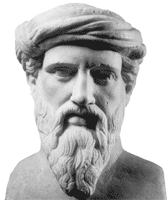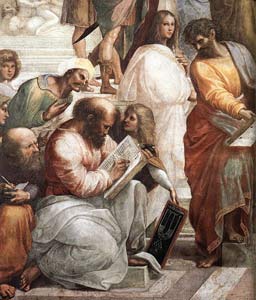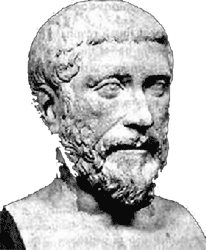 Great characters of Universal Gnosticism
Great characters of Universal Gnosticism  Pythagoras, the Magician of the Numbers
Pythagoras, the Magician of the Numbers
Pythagoras, the Magician of the Numbers |

|

|
| Written by Editor VOPUS | |

The World of the Intuition is the World of the Mathematics. The Gnostic who wants to raise himself to the World of Intuition must be Mathematician, or at least, must have a notion about Arithmetic . Pythagoras is born in the year 580 A.C., in Greece, in the Island of Samos. Since very young he was attracted to the Olympic Religion, specially to the cult of Apollo. However, neither Homer with his sagas, nor the rituals of his religion, could calm his thirst for knowledge. Searching for the Wisdom he went to Asia Minor, visiting Ferecides (one of the 7 Wise of ancient times), from whom Pythagoras received great knowledge. He met Orpheus, and through the iniciatic rites of Demeter and Dionysos, he saw a new dimension of the knowledge, which leaded him with great intensity towards that which is Divine. He continued his search in Babylon, where he learned Astronomy; in Persia he knew the Ahura Mazda’s doctrine; in the sunbathed Land of Kem (Egypt), he studied with the priests of Sais and Heliopolis, assimilating the Esoteric and Mathematical knowledge, and at the same time, he went deep into the Geometry, increasing his knowledge and understanding about the structure of the Divinity; finally, in India he studied the Doctrine of the Transmigration of the Souls, which he called: Metempsicosis. 
He talked about the Karma and the immortality of the Soul in a coherent way: "Man carries inside a part of the Primordial and Divine Energy, which survives the death of the body in the Astral World, so that, according to the ethical behaviour of its previous life, it will return to reincarnate into another body and it will live another existence, and so forth until the final return to the Divine". This thought revolutionized the Paganism and had influence upon the Primitive Christianity. The Psyche, according to Pythagoras "is the intermediary between two worlds: the Material and the Spiritual worlds. It is the Vital Energy that nests and inhabits in the matter". He defended the existence of Elementals and Genies, of intermediate Divinities such as the Olympic Gods, as well as a Superior Divinity that is the beginning and end of everything... This philosophical approach to Nature and Divinity, to man and Cosmos, was always presented from the viewpoint of the Mathematics, because Pythagoras thought that everything could be formulated with an equation. Pythagoras said that the numbers are: absolute principles in Arithmetic; principles applied in Music; magnitudes in a state of rest in the Geometry; magnitudes in motion in the Astronomy, simultaneously serving as measures which determine the nature of things and as exponents that allow us to know the things. "God geometrizes by means of the sound" Pythagoras said; "In the beginning was the Word", said St. John, the seer of Patmos. The Doctrine of the Geometrical Music has the previous postulate as foundation; and it explains the generation of the interludes and the nodes by means of the relation of harmonic distances that exist between the musical notes and the planets of the Solar System. Thus the Do-Re corresponds to the distance from the Earth to the Moon; Re-Mi, from Moon to Venus and so forth. So, in this way the Solar System (and in general the whole Universe) is a great musical staff, where each planet emits its particular note with a great range of sounds. This is what Pythagoras called "The Music of the Spheres", and it served as an Initiatic process in the Pythagorean Schools. Finally, the Teaching of Pythagoras had a great spread, and still in our days, his teaching is considered as fundamental, although many people have not been capable of understanding this Pythagorean Philosophy. 

Comments (0)
 Write comment
|
| < Imhotep, Master of Sciences | Alexandra DAVID-NEEL (1868-1969) > |
|---|
| Science |
| Art |
| Philosophy |
| Mysticism/Religion |
| Barbelo: Gnosis Magazine |